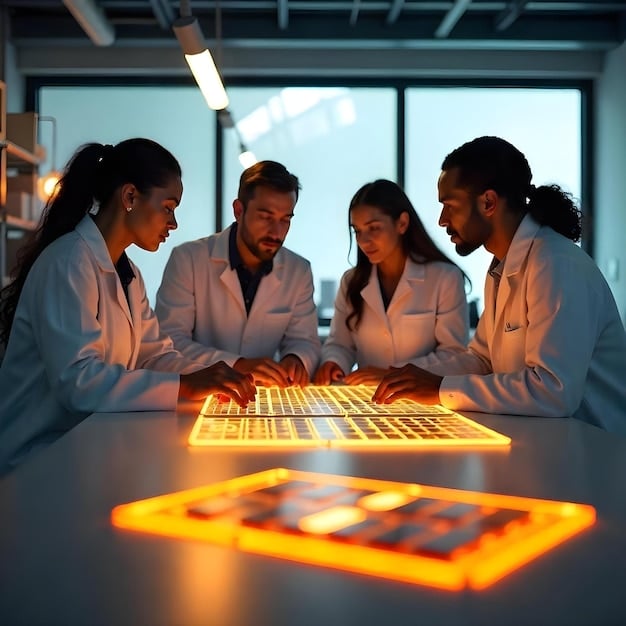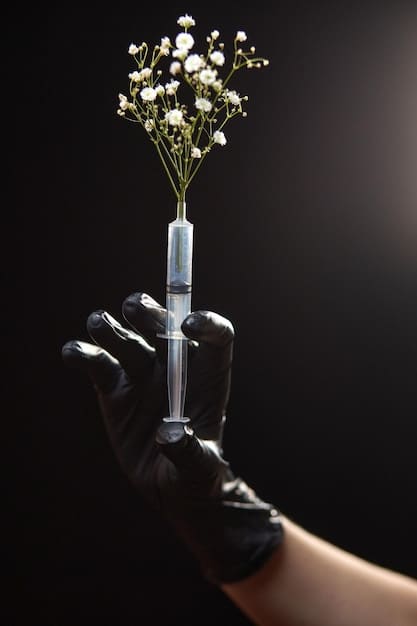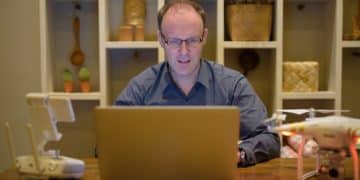H-1B Visa 2025: Biotech Job Opportunities in the US

Biotech professionals aiming for US job opportunities can leverage the updated 2025 H-1B visa lottery system by understanding eligibility, preparing strong applications, networking strategically, and staying informed on policy changes to maximize their chances of selection.
The How Biotech Professionals Can Leverage the Updated 2025 H-1B Visa Lottery System for US Job Opportunities is a critical topic for those seeking to advance their careers in the United States. Understanding the nuances of this system is essential for maximizing your chances of success.
Understanding the H-1B Visa Landscape for Biotech Professionals
The H-1B visa is a non-immigrant visa that allows US employers to temporarily employ foreign workers in specialty occupations. These occupations generally require a bachelor’s degree or its equivalent. For biotech professionals, this visa can be the key to unlocking career opportunities in the US.
H-1B Visa Basics for Biotech Roles
The H-1B visa program attracts highly skilled workers to the US, filling critical gaps in the workforce. It’s particularly relevant for biotech, a field demanding specialized expertise.
Common Biotech Positions Eligible for H-1B
Several biotech roles are commonly eligible for the H-1B visa, including research scientists, bioengineers, and bioinformatics specialists. These positions require specialized knowledge and skills.
- Research Scientist: Conducting experiments and analyzing data to advance scientific knowledge.
- Bioengineer: Applying engineering principles to biological systems and medical technologies.
- Bioinformatics Specialist: Analyzing biological data using computational tools and databases.
- Process Development Scientist: Optimizing manufacturing processes for biotech products.
Understanding eligibility is the first step. Ensuring your qualifications align with the visa requirements is essential for a successful application.

Navigating the 2025 H-1B Lottery System
The H-1B visa program has an annual cap, leading to a lottery system when demand exceeds the available visas. Understanding this lottery system is crucial for biotech professionals seeking US employment.
Key Changes in the 2025 Lottery System
Recent changes to the H-1B lottery system aim to streamline the process and prioritize highly skilled workers. Staying updated on these changes is essential.
How the Lottery System Works
The lottery system randomly selects petitions from the pool of eligible applications. The selection process is designed to be fair and impartial.
The lottery process usually involves:
- Initial Registration: Employers submit an electronic registration for each prospective employee.
- Random Selection: USCIS conducts a random selection from the registrations received.
- Petition Filing: Selected registrants are notified and can then file the full H-1B petition.
- Adjudication: USCIS reviews the petition and makes a decision on approval.
The odds of selection can vary significantly based on the number of applications received each year. Preparing a strong application can increase your chances, even within the lottery.
Preparing a Strong H-1B Visa Application
A well-prepared application is vital to increase your chances of success in the H-1B lottery. This involves careful attention to detail and ensuring all requirements are met.
Essential Documentation and Requirements
Gathering all necessary documents and meeting the eligibility requirements is critical. This includes academic transcripts, employment letters, and visa copies.
Highlighting Biotech Skills and Experience
Showcasing your biotech-specific skills and experience can make your application stand out. Emphasize your contributions to previous projects and your expertise in relevant areas.
This might include:
- Detailed descriptions of your research projects.
- Publications in peer-reviewed journals.
- Patents or inventions related to biotechnology.
- Expertise in specific techniques or technologies.
Focus on demonstrating your unique value to potential employers. Emphasize how your skills and experience align with the company’s needs and goals.

Networking and Job Search Strategies
Networking and strategic job searching are crucial for biotech professionals seeking H-1B sponsorship. Building connections and targeting the right employers can significantly improve your prospects.
Identifying H-1B Sponsoring Companies in Biotech
Researching and identifying companies that have a history of sponsoring H-1B visas is a smart move. This can increase your chances of finding a job opportunity.
Leveraging Industry Conferences and Events
Attending industry conferences and events can provide valuable networking opportunities. Connect with professionals and learn about potential job openings.
Consider attending these events:
- BIO International Convention: A major event for the biotech industry.
- Biotech Week Boston: A week-long series of events focused on biotechnology.
- World Vaccine Congress: An international conference on vaccine development.
- American Society for Microbiology (ASM) Microbe: A conference focused on microbial sciences.
Networking can lead to valuable connections and insights into the job market. Be proactive and engage with professionals in your field.
Understanding Compliance and Legal Considerations
Compliance with H-1B visa regulations is essential for both employees and employers. Staying informed about legal considerations can prevent complications and ensure a smooth process.
Maintaining H-1B Status and Reporting Changes
It’s important to adhere to the terms of your H-1B visa and report any changes in employment or address promptly. Failure to do so can jeopardize your visa status.
Employer Responsibilities and Compliance
Employers also have responsibilities, from paying prevailing wages to adhering to labor laws. Understanding these responsibilities is crucial.
These responsibilities include:
- Paying the required wage rate.
- Providing working conditions that do not adversely affect other employees.
- Notifying USCIS of any material changes in the employment terms.
Staying compliant with regulations is vital for maintaining your H-1B status and ensuring a smooth experience.
Staying Updated on Policy Changes
Immigration policies can change frequently, making it essential to stay informed about the latest updates. Keep up with announcements from USCIS and other relevant agencies.
Following USCIS Announcements and Updates
Regularly check the USCIS website for announcements, policy memos, and updates to regulations. This can help you stay ahead of any changes.
Consulting with Immigration Attorneys
Seeking advice from experienced immigration attorneys can provide valuable insights and guidance. They can help you navigate complex legal issues.
Legal experts can help you to:
- Understand the latest policy changes.
- Assess your eligibility for the H-1B visa.
- Prepare and file your application.
Staying informed and seeking expert advice can help you navigate the H-1B visa process with confidence.
| Key Point | Brief Description |
|---|---|
| 🔑 Eligibility | Ensuring qualifications meet H-1B requirements. |
| 📝 Application | Preparing a detailed and compliant visa application. |
| 💼 Networking | Connecting with companies that sponsor H-1B visas. |
| 📅 Updates | Staying informed on policy changes and announcements. |
Frequently Asked Questions (FAQ)
▼
The H-1B visa is a non-immigrant visa that allows US employers to temporarily employ foreign workers in specialty occupations requiring theoretical or technical expertise. It’s crucial for biotech professionals as it enables them to work in the US if they meet specific qualifications.
▼
To increase their chances, biotech professionals should ensure their applications are complete, accurate, and highlight their specialized skills. Networking and targeting companies known to sponsor H-1B visas can also improve their odds of selection.
▼
Common challenges include the competitive nature of the lottery, meeting the necessary educational and skill requirements, and ensuring compliance with evolving immigration policies. Thorough preparation is key to overcoming these hurdles.
▼
If an employer fails to comply with H-1B regulations, it can jeopardize the employee’s visa status. Employers must adhere to labor laws, pay prevailing wages, and provide suitable working conditions to maintain compliance.
▼
Updates on H-1B visa policy changes can be found on the USCIS website, through immigration attorneys, and at industry conferences. Regularly checking these resources can help biotech professionals stay informed and prepared.
Conclusion
Navigating the updated 2025 H-1B visa lottery system requires biotech professionals to stay informed, prepare diligently, and network strategically. By understanding the eligibility criteria, application process, and compliance requirements, you can significantly improve your chances of securing a US job opportunity.





